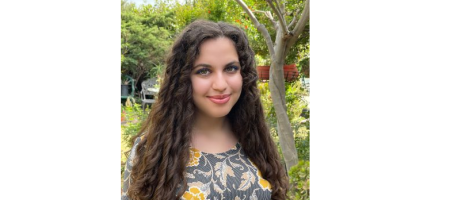Student Spotlight – Desiree Rassa Eshraghi
Meet UCLA undergraduate researcher Desiree Rassa Eshraghi!
Desiree Rassa Eshraghi majors in Psychobiology, minors in Disability Studies, and is in our Undergraduate Research Scholars Program. The title of her project is “Examining Advocacy Strategies for Neurodivergent Patients.” Her best piece of advice for those considering research is to always great to explore what excites you.
How did you first get interested in your research project?
All my life I have been interested in the medical field. This interest was sparked by my older brother’s many experiences with medicine as an autistic and epileptic person with ADHD. As a child, I was inspired by the many medical professionals who interacted and treated my brother, from his neurologist to our shared pediatrician. While I remain committed to medicine as an aspiring physician, I’ve come to realize that the field is not perfect. This is especially true when it comes to its treatment of disabled, specifically neurodivergent individuals. As we grew up, I came to personally appreciate the medical autonomy and self-advocacy that my brother lacked. Rather than as a result of his own inability to speak for himself, but for the convenience of medical staff, my brother’s health concerns were not taken as seriously as my own would have been. As a result, he has often relied on either myself or my parents to advocate for him. The unfortunate reality that my brother’s limited self-advocacy has been created by others’ ableist assumptions led me to analyze the standardized preparedness of medical professionals to treat neurodivergent patients. I also want to examine what methods are best to meet the advocacy needs of such a vulnerable community.
What has been the most exciting aspect of your research so far?
It has been very exciting to understand the topic of neurodivergent patient advocacy from the ground up. There has been a noted and researched lack of preparedness among medical and nursing students to treat neurodivergent populations. I believe that analyzing contributing obstacles to neurodivergent patient care is just as important as examining the efficacies of different advocacy strategies.
What has surprised you about your research or the research process?
The American medical system, despite being designed to treat and care for people’s health, remains a system inaccessible to disabled people. It’s a paradox; many disabled people are solely seen through their medical conditions (as many people are only familiar with the medical model of disability), yet there is a lack of standardized accessible care with built-in adaptive tools in place to accommodate all patients. It’s an unfortunate surprise to learn.
What is one piece of advice you have for other UCLA students thinking about doing research?
Analyze your own interests and see how these interests play into the “bigger picture”. It’s always great to explore what excites you, and understanding the role your niche topic of interest plays on a larger scale will bring focus to your research goals!
What effect do you hope your research has in your field, at UCLA, in your community, or in the world?
I hope my research inspires other pre-med and medical students to recognize just how diverse their future patients may be in terms of life experience, communication needs, and health goals. I hope my research also inspires medical professionals to broaden their skillset to better treat and accommodate the diverse needs of their patients. There is no standard patient, just as there is no standard healthcare worker!


